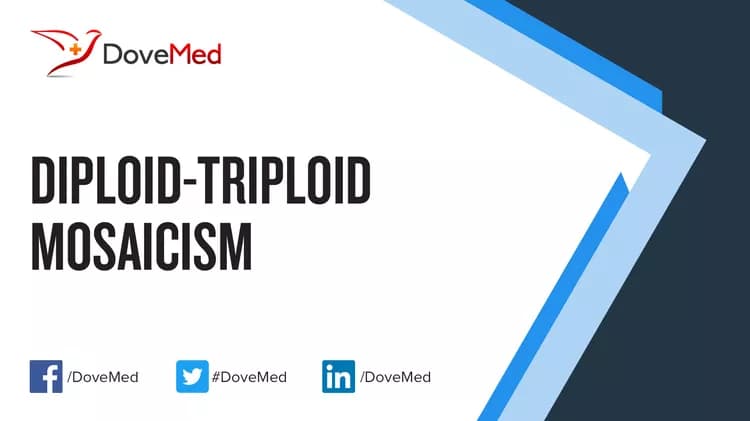What are the other Names for this Condition? (Also known as/Synonyms)
- Diploid/Triploid Mixoploidy
- Growth Retardation, Truncal Obesity, Facial Asymmetry, Hypotonia, Small Phallus, Malformed Low-Set Ears and Micrognathia
- Mosaic Triploidy
What is Diploid-Triploid Mosaicism? (Definition/Background Information)
- Diploid-Triploid Mosaicism is a chromosome disorder. Individuals with diploid-triploid syndrome have some cells with three copies of each chromosome for a total of 69 chromosomes (called triploid cells) and some cells with the usual 2 copies of each chromosome for a total of 46 chromosomes (called diploid cells). Having two or more different cell types is called mosaicism
- Diploid-Triploid Mosaicism can be associated with truncal obesity, body/facial asymmetry, weak muscle tone (hypotonia), delays in growth, mild differences in facial features, fusion or webbing between some of the fingers and/or toes (syndactyly) and irregularities in the skin pigmentation
- Intellectual disabilities may be present but are highly variable from person to person ranging from mild to more severe
- The chromosome disorder is usually not present in blood; a skin biopsy, or analyzing cells in the urine is needed to detect the triploid cells
(Source: Diploid-Triploid Mosaicism; Genetic and Rare Diseases Information Center (GARD) of National Center for Advancing Translational Sciences (NCATS), USA.)
Who gets Diploid-Triploid Mosaicism? (Age and Sex Distribution)
- Diploid-Triploid Mosaicism is a rare congenital disorder. The presentation of symptoms may occur at birth
- Both males and females may be affected
- Worldwide, individuals of all racial and ethnic groups may be affected
What are the Risk Factors for Diploid-Triploid Mosaicism? (Predisposing Factors)
- Currently, no risk factors have been clearly identified for Diploid-Triploid Mosaicism
It is important to note that having a risk factor does not mean that one will get the condition. A risk factor increases one’s chances of getting a condition compared to an individual without the risk factors. Some risk factors are more important than others.
Also, not having a risk factor does not mean that an individual will not get the condition. It is always important to discuss the effect of risk factors with your healthcare provider.
What are the Causes of Diploid-Triploid Mosaicism? (Etiology)
- Diploid-Triploid Mosaicism is caused by the presence of an additional set of chromosomes in an individual
- The additional set of chromosomes may have its origin in the mother (egg) or the father (sperms) during the process of fertilization
- In Diploid-Triploid Mosaicism, not all cells are triploid (having three copies of each chromosome for a total of 69 chromosomes); some cells may have the normal 2 sets of chromosomes for the normal chromosome number of 46
What are the Signs and Symptoms of Diploid-Triploid Mosaicism?
The signs and symptoms associated with Diploid-Triploid Mosaicism may vary among affected individuals, and can include:
- Facial and body asymmetry
- Growth delays
- Decreased muscle tone (hypotonia)
- Limb differences (such as syndactyly of 3rd and 4th fingers of the hands and/or 2nd and 3rd toes; clinodactyly, and/or camptodactyly usually of the 5th finger)
- Minor differences in facial features
- Intellectual disabilities of variable degrees ranging from very mild to severe
- Truncal obesity (may develop later in life)
- Irregular pigmentation of the skin can (may develop later in life)
(Source: Diploid-Triploid Mosaicism; Genetic and Rare Diseases Information Center (GARD) of National Center for Advancing Translational Sciences (NCATS), USA.)
How is Diploid-Triploid Mosaicism Diagnosed?
Diploid-Triploid Mosaicism is diagnosed on the basis of the following information:
- Complete physical examination
- Thorough medical history evaluation
- Assessment of signs and symptoms
- Laboratory tests
- Imaging studies
- Biopsy studies, if necessary
- Karyotyping (chromosome analysis) of skin fibroblasts or urinary cells to check for extra chromosomes in such cells. It is important to note that not all cells carry an extra set of chromosomes among affected individuals. The blood cells are usually normal, and therefore, karyotyping of blood cells is not performed in a blood sample
Many clinical conditions may have similar signs and symptoms. Your healthcare provider may perform additional tests to rule out other clinical conditions to arrive at a definitive diagnosis.
What are the possible Complications of Diploid-Triploid Mosaicism?
The complications of Diploid-Triploid Mosaicism may include:
- Miscarriage
- Birth defects
- Severe intellectual deficiency
Complications may occur with or without treatment, and in some cases, due to treatment also.
How is Diploid-Triploid Mosaicism Treated?
There is no cure for Diploid-Triploid Mosaicism, since it is a genetic condition. The treatment is usually given to manage the signs and symptoms and any complication that develops.
How can Diploid-Triploid Mosaicism be Prevented?
Diploid-Triploid Mosaicism may not be preventable, since it is a genetic disorder.
- Ultrasound imaging and karyotyping of a developing fetus may help identify the condition during pregnancy, and counseling may help the parents understand the risks
- Active research is currently being performed to explore the possibilities for treatment and prevention of disorders such as Diploid-Triploid Mosaicism
- Regular medical screening at periodic intervals with tests and physical examinations are recommended
What is the Prognosis of Diploid-Triploid Mosaicism? (Outcomes/Resolutions)
- The prognosis of Diploid-Triploid Mosaicism is dependent upon the severity of the signs and symptoms and associated complications, if any
- Individuals with mild conditions have better prognosis than those with severe symptoms and complications
- Typically, the prognosis may be assessed on a case-by-case basis
Additional and Relevant Useful Information for Diploid-Triploid Mosaicism:
- Diploid-Triploid Mosaicism may be also known by as Diploid/Triploid Mosaicism
The following DoveMed website link is a useful resource for additional information:
Related Articles
Test Your Knowledge
Asked by users
Related Centers
Related Specialties
Related Physicians
Related Procedures
Related Resources
Join DoveHubs
and connect with fellow professionals


0 Comments
Please log in to post a comment.